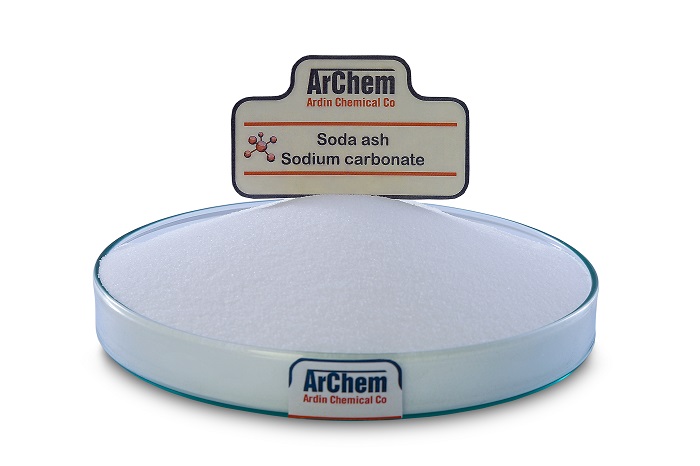Soda Ash is a white powdered or granular material with the chemical formula Na2CO3. It is an alkali chemical, which is an essential component for many products. This product is used in the manufacturing of glass, detergents, lithium-based batteries, pharmaceuticals, adhesives, etc.
ArChem provides Soda Ash and other raw chemical materials such as Ammonium Nitrate, Sodium Nitrate, LABSA, SLES, Caustic soda and Ammonium Chloride for various industrial applications. Additionally, ArChem provides customers with other chemical products including Nitrocellulose, Nitrocellulose solution, organic solvents, etc. for further information please contact our technical sales team in ArChem.


Soda Ash (also known as Sodium Carbonate) is an inorganic compound, which has been used in many industries. There are three grades of Soda Ash, including:
Dense Soda Ash is an anhydrous substance. This grade of Sodium Carbonate is mostly used in the manufacturing of glass.
Light Soda Ash is used as a buffering agent in different industrial processes.
Washing Soda is mostly used in soaps and detergents.
Archem Soda Ash is the water-soluble sodium salt of carbonic acid. Chemical and physical properties of ArChem Soda Ash are:
| Molecular Formula | Na2CO3 |
| IUPAC name | Disodium carbonate |
| Cas Number | 497-19-8 |
| Molecular weight | 105.988 g/mol |
| Density | 2.54 gcm–3 |
| Boiling Point | 1600 °C |
| Flashpoint | Not Applicable |
| Melting Point | 851 °C |
| Flammability | Not combustible |
Archem Sodium Carbonate is a white, odorless powder with a strongly alkaline taste. Common applications of sodium carbonate include:
Soda Ash is produced by two main methods, natural production and synthetic production.
In this method, Soda Ash is produced by extracting Trona ore. Then, it is prepared with some separation processes like filtering, crystallization and drying.
Synthetic Soda Ash is produced by the Solvay method. Sodium chloride is reacted with calcium carbonate in the presence of ammonia. Soda Ash which is produced in this procedure, is more costly than the natural production method.
To buy Soda ash, you should first find soda ash suppliers and distributors around the world. There are different ways to find the best suppliers and distributors. Some of these ways are:
When contacting suppliers or distributors, it’s essential to inquire about their product availability, pricing, minimum order quantities, delivery options, and any other information for your specific needs. ArChem is one of the best suppliers of raw chemical materials at the international level. our partnerships with top suppliers in the market enable us to provide the highest quality Soda ash for different industries.
Storage conditions of ArChem Soda Ash are listed below:
Prolonged inhalation of soda ash dusts may irritate nose, throat, and lungs. Prolonged contact may cause skin irritation. Plus, ingestion may cause nausea, vomiting, stomach ache, and diarrhea.
Some of necessary first-aid measures are described as below:
Operators should wash hands before breaks and after work. they should use personal protective equipment and wear chemical impermeable gloves, when handling soda ash to avoid contact with the body, skin, and eyes.
Soda Ash is used in the manufacturing of glass, detergents, lithium-based batteries, pharmaceuticals, etc.
Soda Ash also known as washing soda and soda crystals.
ArChem raw chemical materials can be purchased in a variety of volumes. Depending on your orders, Prices are different. for more information, please contact our technical sales team in ArChem.
Sodium Carbonate in solid form or in very concentrated solution, can be potentially harmful.
The CAS number of Soda Ash is 497-19-8.
The HS code of Soda ash is 28362020.